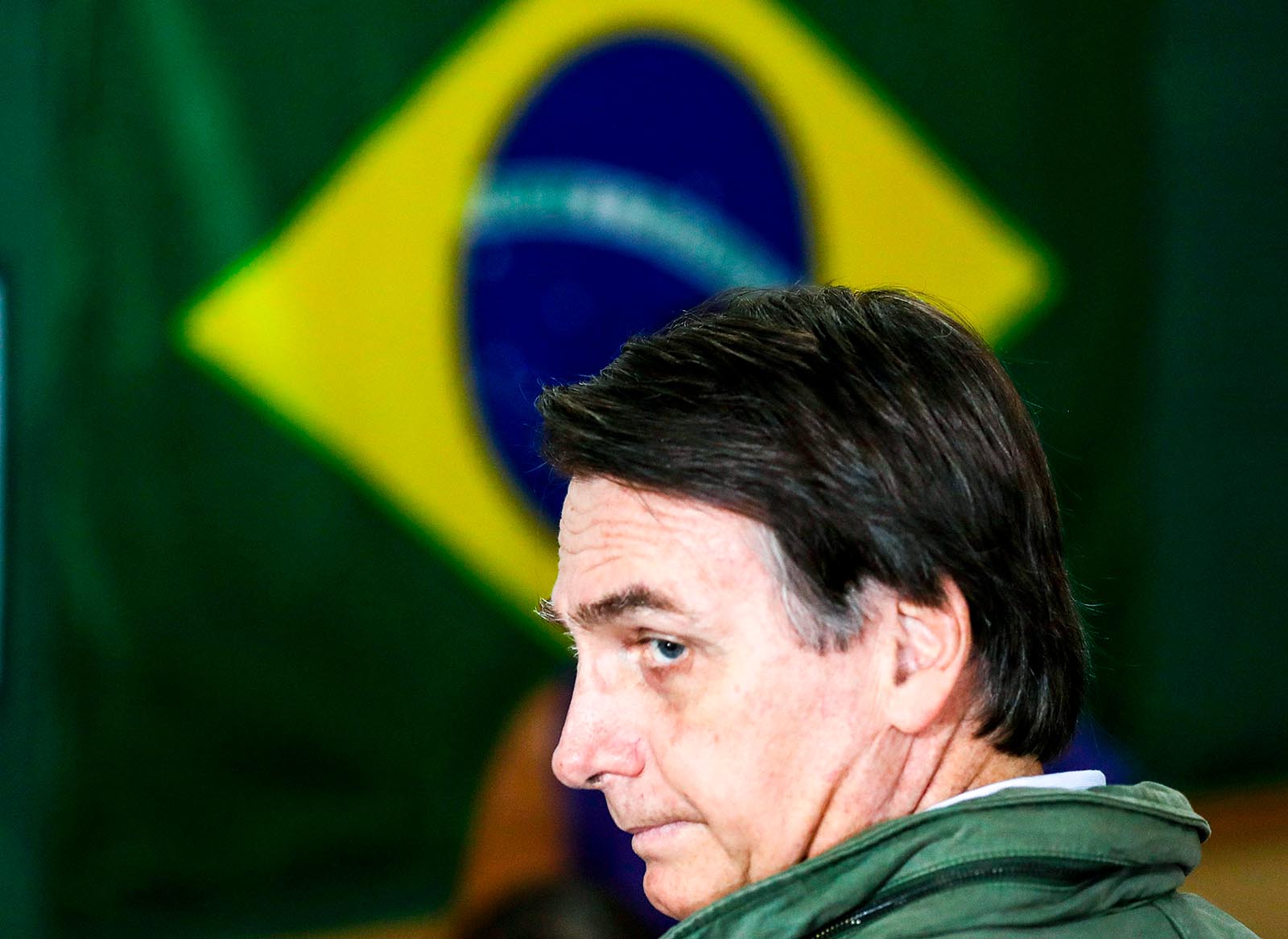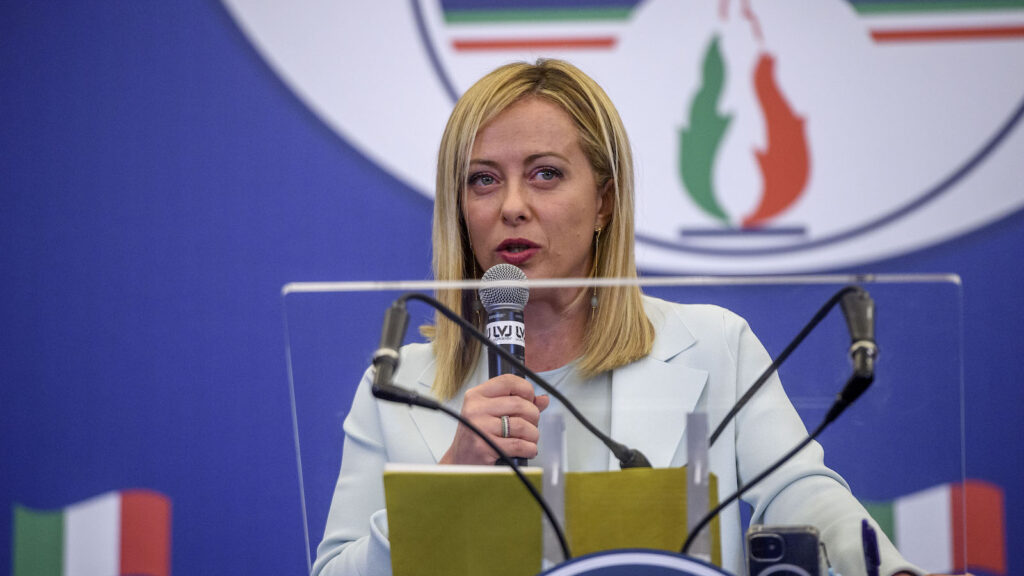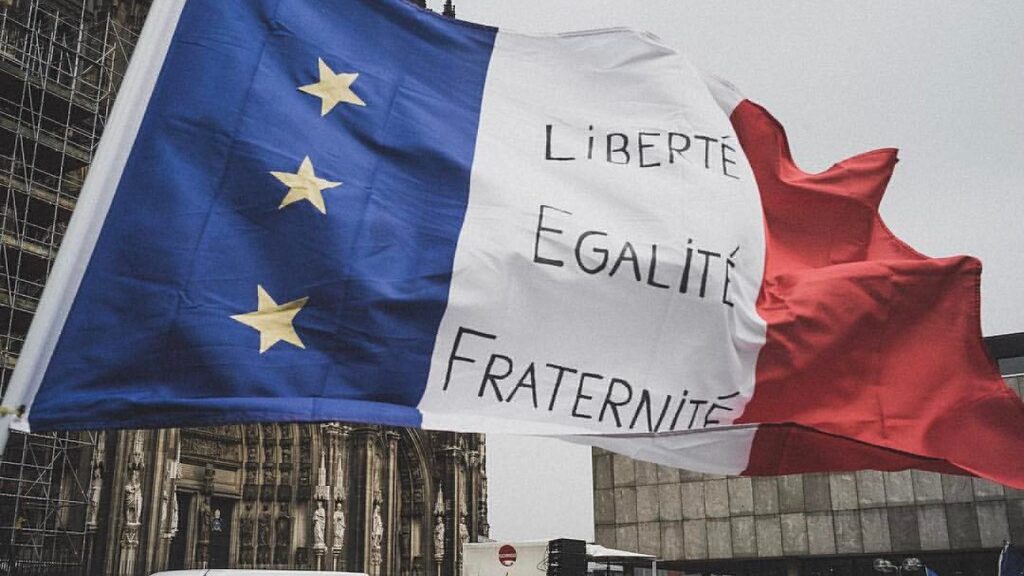What To Expect from Bolsonaro’s Brazil

Brazil's right-wing presidential candidate for the Social Liberal Party, Jair Bolsonaro, votes during runoff elections in Rio de Janeiro, Brazil. He would go on to win with 55 percent of the vote.
Photo: Ricardo Moraes/AFP/Getty Images
The creeping menace of nationalist-fueled populism just hooked its biggest fish. On Sunday, Brazil, the world’s fifth-largest country and eighth-largest economy, overwhelmingly elected the right-wing Jair Bolsonaro of the Social Liberal Party (PSL), with a whopping 55 percent of the vote. This election continues a worrisome global trend toward populist extremism. The regimes of Venezuela, Cuba, and Nicaragua aside, Mr. Bolsonaro now poses the greatest threat to democracy in Latin America today.
Brazilians’ disgust with widespread graft, rampant crime, and the country’s worst-ever economic recession converted the 210-million-person South American nation into the perfect laboratory for a previously unknown strongman.
So what does it all mean for Brazilians, the region, and the world? With the campaign dust still settling, here’s a panoramic tour of what we can expect from the next government.
Clear Road Ahead for Bolsonaro’s Agenda
Make no mistake. Mr. Bolsonaro enters office with a mandate. Pay no attention to those who believe he will moderate his tone once in office. Like the U.S. or Italian governments today, Mr. Bolsonaro will govern by dividing, polarizing, and putting his political enemies on the defensive. He won the first and second round handily. In congressional elections and gubernatorial races on October 7, the PSL picked up 52 seats in the Chamber of Deputies, where previously it held just one, as well as four senators, where before it had none.
Mr. Bolsonaro swore to govern with “less Brasilia and more Brazil.” That is a warning to any politician standing in his way. Brazil’s hugely unpopular Congress will bend to the desires of the popular president. We should take Mr. Bolsonaro at his word. Congress won’t dare stand up to him, at least during his first year.
First Up: Crackdown on Crime
An iron-fisted security platform was key to Mr. Bolsonaro’s success, even among populations that he smeared with racist and sexist remarks. Brazil’s poor are the ones to suffer most from the country’s exploding crime rate. Mr. Bolsonaro will make good on his law and order promises to come down hard on criminals.
Expect a militarization of Brazil’s cities by emboldened security forces. Ten years ago, Brazil brought “pacifying police units” to the favelas in Rio de Janeiro. Mr. Bolsonaro will replicate and expand this hardline tactic around the country. And, it is likely to be hugely popular, at least initially.
Philippine President Rodrigo Duterte’s quashing of criminality will seem downright Swedish in comparison. Greater bloodshed in Brazil is a given, as is the concomitant criticism that will emerge from respected human rights organizations around the world denouncing the violence and lack of due process. Those doing business with the Bolsonaro government will come under considerable scrutiny.
Market Reforms Are Coming, but How Many Is Unclear
Paulo Guedes, Mr. Bolsonaro’s economic guru, is a “Chicago Boy” to a T. Mr. Guedes has publicly doubled down on the need to privatize state-owned enterprises, cut taxes, overhaul regulations, and increase trade. It’s no wonder why Brazil’s stock market and currency have done so well in the last few months. As Mr. Bolsonaro inched closer to power, the market has savored the possibility of a whole new free-market turn in Brazil.
Yet neoliberals should hold off on celebrating. Mr. Bolsonaro vowed to give Mr. Guedes full power over a new ministry combining the responsibilities of finance, planning, and trade. But the president-elect hasn’t always been a free-market reformer, and in the last weeks of the campaign, he has sent mixed signals. His three decades in Brazil’s Congress reveal a voting record of a typical Brazilian statist politician: Mr. Bolsonaro supported policies that protected noncompetitive companies and opposed privatizing the telecoms and oil industries.
Indeed, let’s also not forget that Brazil’s private sector can be famously protectionist, too, from steel to agriculture to chemicals. Big business flocked to Mr. Bolsonaro in recent months, yet the same business leaders will be lobbying furiously against any attempt to loosen their lucrative grip on industry.
Brave talk on privatization risks becoming just that. In interviews just weeks before the election, Mr. Bolsonaro warned that no minister should expect to have a free hand. The message was clearly aimed at Mr. Guedes. Mr. Bolsonaro knows that full-steam-ahead privatization could unleash social unrest in the short term. A sharp rise in unemployment might bring workers to the streets, pushed by the losing Workers’ Party (PT). Should that happen, Mr. Bolsonaro and his cadre of advisers need to avoid the temptation to forcefully repress street protests. In Brazil, cracking down on peaceful street demonstrations will be a political boomerang.
Mr. Bolsonaro has the capacity to be a change agent, but his extremist political and social policies should worry anyone doing business with Brazil.
Clashing Egos and Power Struggles
Economic policy and radical reforms will depend on Mr. Guedes staying in power for an extended period. For all their backslapping, a Bolsonaro-Guedes duo might see a clash not only of policies but of personalities. The two powerhouses have known each other for less than a year.
There’s also the military to worry about—no small matter. Mr. Bolsonaro relies heavily upon military officials in his inner circle. His allies, retired police and military officers, will oppose a radical privatization that might impede their access to lucrative state contracts in infrastructure, agriculture, and mining.
Tough Pension Reform Is the First Step
Pension reform will be a first signal of just how daring Mr. Bolsonaro really is. Many expect the new government to move fast and hard on pension reform. But here again, nobody knows what Mr. Bolsonaro will propose. As a candidate, Mr. Bolsonaro has reiterated that it’s a top priority to shrink Brazil’s budget deficit. Pension reform would make for a strong, albeit divisive, first victory for the administration.
Mr. Guedes will certainly propose a massive reform much like the private sector-financed Chilean pension system. But Brazil is a country with staggering numbers of public employees—and many are former military officers. While Guedes-aligned supporters want to rip off the Band-Aid, Mr. Bolsonaro has wavered. Millions of civil service and military pensions have been the key guardrails protecting against falling back from middle-class gains during the years of recession. They won’t be given up easily.
Foreign Policy: A Tough Line on Venezuela—and Room for Leadership
Mr. Bolsonaro’s election ups the pressure on the failed leftist regime of Venezuela’s Nicolas Maduro. Venezuela benefitted from friendly relations with the Workers’ Party governments of Lula da Silva and Dilma Rousseff. And, during the campaign, PT’s presidential candidate Fernando Haddad cited Venezuela’s sovereignty and said that Brazil should “not take sides.”
In contrast, Mr. Bolsonaro has promised that Brazil’s policy toward Venezuela will change. Mr. Bolsonaro may well close the border with Venezuela, impeding the further flow of refugees. This can only be done with a large-scale militarization of the jungle border. Inevitably, rhetoric will heat up on both sides.
But, Venezuela will not dare strike its larger neighbor. With the support of center-right countries like Argentina, Colombia, Peru and Chile, Brazil could even emerge as a regional leader in the crackdown on the Maduro regime.
Stronger U.S. Ties and a True Trumpian Outlook
A Bolsonaro government will be an unequivocal ally of the United States. Indeed, Mr. Bolsonaro could become a favorite of President Donald Trump: a veritable Latin American Bibi Netanyahu. On the campaign trail, Mr. Bolsonaro fawned over President Trump. His potential minister of foreign affairs, Ernesto Fraga Araújo, has argued that President Trump is saving Western Christian civilization from radical Islam and “globalist cultural Marxism,” terms with anti-Semitic histories.
This translates to cooperation on anti-narcotics efforts and support for Washington in international forums. Mr. Bolsonaro may be hedging on his vow to withdraw from the Paris climate accords. But, he has signaled that he will follow Mr. Trump’s lead in moving the Brazilian embassy in Israel to Jerusalem, even though this could spell trouble for Brazil’s soaring beef exports to the Arab world.
Brewing Collision with China
One of the areas to watch closely is how Mr. Bolsonaro’s “Brazil First” policies will affect the country’s relations with China. His populist streak on the campaign trail cast China as a predator trying to buy up the country. Mr. Bolsonaro has said he is against privatizing Eletrobras, a large electric utility company owned by the federal government of Brazil, because it would “leave Brazil in Chinese hands.” Mr. Bolsonaro even ruffled feathers by visiting Taiwan in February and calling Taiwan a country. Nothing is more toxic to China than referring to Taiwan as a separate nation.
Mr. Bolsonaro’s anti-China rhetoric will surely be toned down. China is Brazil’s principal trading partner and by far the largest purchaser of Brazil’s agricultural commodities.
Destabilization of the Free Press
Mr. Bolsonaro and his allies have fiercely attacked free press in Brazil, referring to the media as “trash” and “fake news.” He has threatened to cut state advertising for O Globo and Folha de São Paulo, two of the largest media outlets in Brazil. Importantly, his threats will also dissuade private-sector advertising to these outlets.
Decades ago, Charles de Gaulle reportedly quipped that “Brazil is the country of the future … and always will be.” Mr. Bolsonaro has the capacity to be a change agent for the country’s economy. But his ultra-extremist political and social policies should worry anyone doing business with Brazil.
Fasten your seat belts. This will be a bumpy ride.




